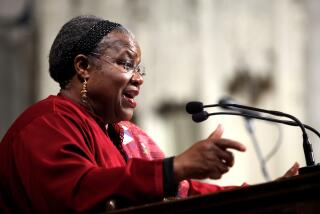Chris Connor dies at 81; big-band and solo jazz singer
- Share via
Chris Connor, a smoky-voiced jazz vocalist who gained renown for her recording of “All About Ronnie” and other singles with the Stan Kenton Orchestra before going solo in 1953 and having success with songs such as “Trust in Me” and “About the Blues,” has died. She was 81.
Connor died of cancer Saturday at Community Medical Center in Toms River, N.J., said her longtime companion and manager, Lori Muscarelle.
In a more than 50-year singing career that began in the late 1940s with the Claude Thornhill Orchestra, Connor recorded with bandleader Herbie Fields and sang with Jerry Wald’s big band before joining Kenton in early 1953.
Known for what has been described as her “warm, cello-like tones” and using little or no vibrato, she achieved her greatest acclaim beginning in the mid-1950s singing with small groups made up of established jazz musicians.
“She, along with Carmen McRae, really pioneered jazz trio singing where they’d stand in front of a mike and, supported by piano, bass and drums, created enormous intimacy,” said jazz historian and journalist Marc Myers.
Connor’s first album, recorded in 1954, was “Chris Connor Sings Lullabys of Birdland,” with the Ellis Larkins Trio.
“What you begin to hear with Chris are breathy vocals and a slick-chick delivery that was both sexy and savvy,” he said. “You never got the feeling with Chris that she was a helpless female, but you never got the feeling that she was bossy, either. And, as a result, almost everyone who heard her fell in love with her.”
The interesting thing about Connor, said jazz critic Don Heckman, was that “she came along at a time when there was a concept of coolness coming into jazz -- the Miles Davis ‘Birth of the Cool’ recordings and the general sense of coolness that was associated with West Coast jazz, which was becoming very popular.
“The clear sound of her vibrato-less vocals and her cool onstage manner always reminded me of the detachment of the [Alfred] Hitchcock heroines of the time.”
Connor was born Mary Loutsenhizer in Kansas City, Mo., on Nov. 8, 1927. Although she studied clarinet for eight years, she later said that she always wanted to be a singer.
“I never took lessons,” she told the Buffalo News in 1996. “I like a natural singer better.”
While working as a secretary after graduating from high school, she spent weekends singing with a Kenton-influenced college jazz band at the University of Missouri.
In 1949, after moving to New York City, she joined the Claude Thornhill Orchestra as a member of the four Snowflakes, Thornhill’s singing group.
Connor was singing with Jerry Wald’s band when former Kenton vocalist June Christy heard her on a radio broadcast from a New Orleans hotel and recommended her to Kenton.
As a singer, Connor was often compared to Christy and Anita O’Day, who preceded them in the Kenton band. But, Myers said, “she didn’t set out to be like them. It so happened her voice had similar characteristics.”
In a 1986 interview with the San Diego Union-Tribune, Connor acknowledged that she “went to school” on O’Day but also studied the style of Billie Holiday, Ella Fitzgerald and Christy.
“I may have spent more time studying Anita and June because I made up my mind early on I wanted to sing with the Kenton band,” she said.
Connor’s recording of the ballad “All About Ronnie” and other recordings with Kenton brought her national acclaim. But tired of the grind of performing on the road, she left Kenton in mid-1953 and soon launched her solo career.
After a year and a half with Bethlehem Records, Connor signed with Atlantic Records, where she recorded from 1956 to 1962.
Although her career took a downturn after leaving Atlantic, she continued recording for other labels until 2003. Her last appearance was at the Iridium Jazz Club in New York City in 2004.
In addition to Muscarelle, Connor is survived by a nephew. Services will be private.
More to Read
Start your day right
Sign up for Essential California for the L.A. Times biggest news, features and recommendations in your inbox six days a week.
You may occasionally receive promotional content from the Los Angeles Times.







